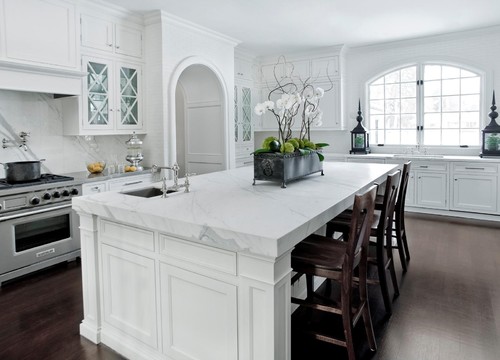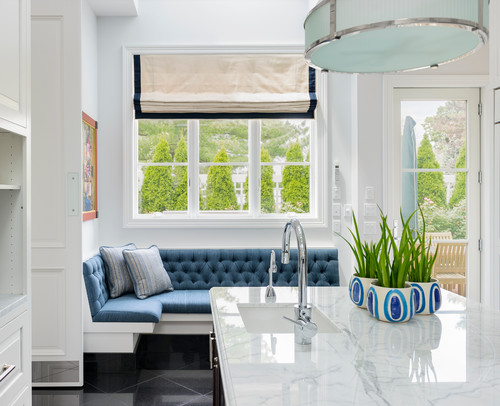Quartz vs Granite vs Marble Counters: How to Choose?
Quartz vs Granite vs Marble Counters. Are you wondering how they compare?
There are a lot of factors to consider when choosing the right countertop for your home. Do you want something that is durable? easy to clean? beautiful? unique?
Quartz, granite, and marble are all popular choices for countertops, but each has its own pros and cons.
In this blog post, we will take a closer look at each material and help you decide which one (Quartz vs Granite vs Marble) is right for you!

Traditional Kitchen, Detroit | Photo by Caden Design Group
| Quartz | Granite | Marble | |
| Pros | •Non-porous (No sealing required!) •Manmade, so it’s consistent in color and pattern •Tons of color options •Low-Maintenance | •Beautiful & Unique •Relatively Low-Maintenance •Durable/Easy to Repair | •Stunning & Classic •Works well with any style •The stone is workable & customizable •Faster delivery (usually) |
| Cons | •Some quartz owners report chips, scratches, and heat damage •Cost •Can be UV damaged; avoid installation outdoors or in very sunny rooms | •Requires periodic sealing •Granite will stain, scratch, and possibly get stinky if the sealant degrades | •Soft and scratchable •Stains easily •Needs to be sealed faithfully •Difficult or impossible to fix if it gets damaged |
| Cost | Good Quality $50-$65/sq ft Better Quality $65-$75/sq ft Best Quality $75-$150/squ ft | Average Slabs $45-$80/sq ft Unusual or Exotic up to $250/sq ft | Common Types (like Carrara) $40-80/sq ft Rarer Types (like Calacatta) $175-200/sq ft |
| Most Popular Colors | white black gray | white brown black gray | white ivory |
| Cleaning | |||
| Stains | •Very stain resistant •If something does stain, it can usually be removed | •Can stain if not sealed properly •Possible to remove stains | •Very stain prone, even if sealed •Nearly impossible to remove stains |
| Upkeep | Clean with soap and water | •Use a granite cleaner •Reseal every year (or every 6 months if used daily) | •Use a granite cleaner •Reseal every 6 months to protect |
| Heat | •Use a trivet or hot pad to protect the surface •Do NOT set hot items directly on counter | •Use a trivet or hot pad to protect the surface •Do NOT set hot items directly on counter | •Use a trivet or hot pad to protect the surface •Do NOT set hot items directly on counter |
| Mohs Hardness Score | 7-8 | 6-8 | 3-5 |

Transitional Kitchen, Seattle
GRANITE (Quartz vs Granite vs Marble Counters)
Granite is a popular choice for countertops. This natural stone is beautiful and unique. Granite is also very durable and easy to care for.
Pros of Granite
- Granite countertops are beautiful and unique
- They will add value to your home
- Granite countertops are very durable and could last for up to 100 years or more
- Granite countertops are easy to care for
Cons of Granite
- Granite countertops can be expensive
- It is a heavy material and it can be expensive to install
- Granite is difficult to cut
- Granite countertops need to be sealed every 6-12 months
Cost
You should expect to pay between $80 and $100 per square foot for good-quality granite.
The cost of granite countertops can vary depending on the quality of the stone, how unusual the pattern or veining is, and the size of the counters you need in your kitchen.
Colors
Granite comes in a variety of colors, including white, black, blue, brown, gold, and red.
Cleaning
Granite countertops are easy to clean. You can use a mild soap and water solution to wipe them down, or you can use a granite cleaner like this one.

Cutting
Granite is one of the strongest countertop materials on the market.
Like most natural stone, it can easily resist knife blade cuts. However, cutting directly on your granite countertop will damage the sealant and make your countertop vulnerable to future damage.
Therefore, cutting on granite without a cutting board is NOT recommended.
Stains
Granite is a porous material, so it can stain if it is not sealed properly. Be sure to seal your granite countertops every 6-12 months.
Many stains can be removed from granite with a little elbow grease and a good granite cleaner. If you have a severe stain, though, you may need to call in a pro.
Heat Resistance
You should not set hot pots directly on your granite countertop. Use a trivet or hot pad to protect the surface.
Granite can be heat damaged. If a hot pan is placed directly on the countertop, it can cause the granite to discolor or crack.
Upkeep
You will need to reseal your granite counters every 6 months or so, but other than that, they are pretty low maintenance.
Protection
To protect your granite countertops, you should:
- Wipe up spills immediately
- Use a cutting board when preparing food
- Use coasters for glasses and mugs
- Place hot pots on a trivet or hot pad
- Clean the countertops regularly with a granite cleaner
- Seal your granite countertops every six months to prevent staining and smells

Transitional Kitchen, New York
MARBLE (Quartz vs Granite vs Marble Counters)
Marble is a beautiful, natural material that has been used for centuries in art and architecture. It is also a popular choice for countertops. Marble is unique and will add a touch of luxury to your home.
Pros of Marble
- Marble is stunning and works well with just about any design style
- Marble is highly workable, so it’s great for non-rectangular cuts, decorative edges or other unique fabrication features
- Most marble is widely available, which means there is less wait-time after ordering
Cons of Marble
- Marble is a soft stone and will scratch
- It also stains easily and, usually, permanently
- Marble needs to be sealed faithfully
- Nearly impossible to fix chips, cracks, or scratches
Cost
More common types of marble, like Carrara, are less expensive because they are more easily obtained. Carrara marble costs between $40-80/sq ft.
Rarer types of marble, like Calacatta, are more expensive because they are less available. Expect to pay between $175-200/sq ft for this type of marble.
Colors
Marble counters are available in white, beige, green, grey, black, blue, gold, brown, and even red.
Cleaning
There are a variety of marble cleaners on the market. These are two of the best:


Cutting
Cutting on marble is not advised for a couple of different reasons. First, natural stone will dull even the sharpest knife, and second, marble is somewhat delicate. It can be damaged and scratched.
Stains
Marble is a porous material, so it can stain if it is not sealed properly. Be sure to seal your marble countertops faithfully.
Once a stain gets into marble, it is nearly impossible to remove.
Heat Resistance
Marble can be heat damaged. If a hot pot is placed directly on the countertop, it can cause the marble to stain or crack. Be sure to always use a hot pad.
Upkeep
If you use your kitchen regularly, you will need to reseal your marble counters every 6 months or so.
To reseal marble countertops, you will need to purchase a sealer specifically designed for marble.
Before you apply a marble sealer, clean the countertops with a mild soap and water solution.
Once the countertops are clean and dry, apply the sealer according to the manufacturer’s instructions.
Protection
To protect your marble countertops, you should:
- Wipe up spills immediately
- Use a cutting board when preparing food
- Use coasters for glasses and mugs
- Place hot pots & pans on a trivet or hot pad
- Clean the countertops regularly with a marble cleaner
- Seal your marble countertops every 6 months to prevent staining
Durability
Marble is generally not as durable as quartz or granite. It is the softest of the three stones and is damaged more easily.

Transitional Kitchen, Atlanta
QUARTZ (Quartz vs Granite vs Marble Counters)
Quartz is one of the most popular materials for countertops. It is a man-made material made from natural quartz crystals, resin, and silicon dioxide. Quartz countertops, like granite and marble, have grown in popularity as a result of their durability and aesthetic appeal.
Pros of Quartz
- Non-porous (No sealing required!)
- It is manmade, so it’s consistent in color and pattern
- Tons of color options
- Relatively durable
Cons of Quartz
- Expensive
- Installation can be difficult
- Cannot be installed outdoors
- Can be damaged by direct heat
Cost
Quartz countertops vary in cost depending on the quality of the material. However, they are generally more expensive than granite and marble countertops.
Higher-quality quartz countertops are more stain, scratch, and crack resistant. They also last longer and release fewer volatile organic compounds (VOCs).
A high-quality quartz countertop will cost approximately $75-$150 per square foot.
We don’t recommend purchasing lower-grade or even mid-grade quartz because these materials are easy to damage with regular kitchen use.
Colors
Quartz is manmade and because of that comes in an almost unlimited variety of colors.
The most popular color for quartz countertops is white, followed by gray and black.
All of these are neutral, classic colors that should not become dated.
Cleaning
Use only plain soap and water to clean your quartz counters.
Stay away from acidic or abrasive products because they can damage the surface.
Cutting
Quartz is a hard material, but cutting directly on the countertop can still damage the surface. The best plan is to continue using a cutting board to protect your counters.
Stains
Quartz is a non-porous material, so it does not absorb liquids. This makes it resistant to staining.
If you do get metal marks, watermarks, or something that looks like a stain on your quartz countertop, try this amazing cleaner:

Heat Resistance
Quartz is heat resistant, and some folks swear that quartz can handle the heat from hot pots and pans.
However, we do not recommend setting hot items directly on your quartz counters because you may get scorch marks. Check out this photo for an example.

Upkeep
Quartz counters do not require a lot of upkeep. In fact, they do not even need to be sealed since they are manmade and are created at the factory with a strong, durable surface.
Protection
- Wipe up spills immediately
- Use a cutting board when preparing food
- Use coasters for glasses and mugs
- Place hot pots on a trivet or hot pad
- Clean countertops regularly
- Do not use acidic cleaners, disinfectant wipes, or anything abrasive
So, which is the best choice: quartz, granite, or marble?
As you can see, there are multiple criteria to consider when choosing countertops. But don’t let that overwhelm you! Just take your time, do your research, and pick the material that is the best fit.
If you are looking for a beautiful, unique countertop that will add value to your home, and money is of no concern, marble is the obvious choice.
If you are looking for a durable, easy-to-care-for countertop, quartz or granite will be the better option for you.
Which material are you going to choose for your home? Let us know in the comments!
6 comments
Comments are closed.